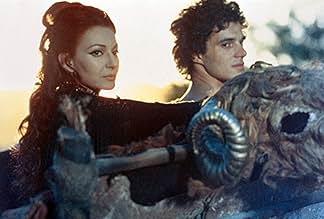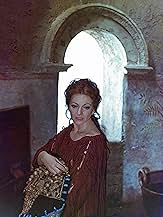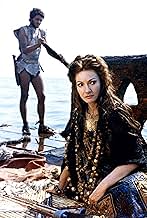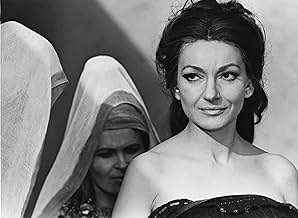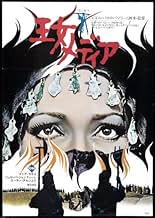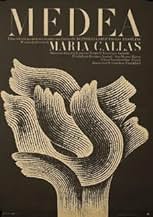IMDb रेटिंग
6.9/10
5.8 हज़ार
आपकी रेटिंग
गोल्डन फ्लीस को पुनः प्राप्त करने की अपनी खोज के बाद, जेसन शक्तिशाली जादूगरनी मेडिया के साथ ग्रीस लौटता है।गोल्डन फ्लीस को पुनः प्राप्त करने की अपनी खोज के बाद, जेसन शक्तिशाली जादूगरनी मेडिया के साथ ग्रीस लौटता है।गोल्डन फ्लीस को पुनः प्राप्त करने की अपनी खोज के बाद, जेसन शक्तिशाली जादूगरनी मेडिया के साथ ग्रीस लौटता है।
- निर्देशक
- लेखक
- स्टार
- पुरस्कार
- 2 कुल नामांकन
Margareth Clémenti
- Glauce
- (as Margareth Clementi)
Annamaria Chio
- Wet-nurse
- (as Anna Maria Chio)
फ़ीचर्ड समीक्षाएं
This version of Medea, overall quite excellent, captures interesting aspects of the original piece. Familiarity with the story is necessary, though, and Passolini's story picks up a bit earlier than Euripides'. He runs through a stream of largely non-verbal sequences that establish a strong sense of place and emotional element that carry through the film. Classicists will enjoy the visual presentation of Iolkis, Chalkis, and their inhabitants -- though I still find it puzzling why the Argo is presented as little more than a raft; perhaps the budget was squandered on making a believable Centaur. Nonetheless, this film captures the mystical, religious, and passionate elements of Euripides' vision, and is highly recommended.
Being familiar with the story and Maria Callas, on the opera stage unrivalled as a singing-actress, were my main interests into watching Medea, having never seen a Passolini film before. I didn't love it, however I also didn't hate it, though I can see perfectly both viewpoints. I don't think Medea is a flawless film, some of the anachronisms did go over my head, the film due to some sluggish pacing can get dull at times, the centaur's monologue- though much of Medea is dialogue-free- goes on forever and gets tedious quickly and the way Jason's role is written and performed is too simplistic and rather amateurish. However, I did think it looked great, the locations are really unique and beautiful to look at and the cinematography gives a grim and surreal feel that actually suits the story. You can definitely sense that there is a sense of time and phrase, and it is quite clear here. The music is also incredible, it draws you right in, is very bold in orchestration and captures the atmosphere of the drama superbly. Passolini directs very assuredly on the whole, some scenes are evocatively savage and if there are any highlights they are Medea's mesmerising entrance and the genuinely frightening climax. The centaur is beautifully played, looking imposing and the relationship between him and Jason is the most convincing of the relationships between the characters. The main merit of Medea is Maria Callas' titular role performance, like she did on the opera stage with an intelligent, sensual and quite menacing presence she completely dominates every scene she appears in and is incredibly magnetic. Overall, more a film I appreciate but worth watching for Callas, the visuals and the score. 6/10 Bethany Cox
10Damo-2
Medea is an extraordinary film which some will find difficult. Telling the story of Jason and his quest for the Golden Fleece, this is not the stuff of Ray Harryhausen. Meeting the priestess of the Fleece, Medea, he falls in love with her and takes her home. Years later, after bearing him sons, she exacts a terrible revenge after he spurns her for a new love. Medea is also extraordinary in exhibiting Pasolini's demonstration of contrasts in plot development and framing. In the sequence in which we are introduced to Medea, we witness the mesmeric nature of a human sacrifice, which changes from the ecstatic to the horrific within the same sequence. This motif recurs throughout the film, and has prompted admiration from French philosopher Gilles Deleuze, who mentions Pasolini in his treatise on the movement-image. Filmed with a mixture of professional and non-professional actors, Medea is a challenging and refreshing change from the usual, as it builds up to a frightening climax in an unconventional way. Often shown in 'World Cinema' slots late at night, it's a film worth staying up for, or recording, for those seeking an alternative to Hollywood pap.
I love Pasolini, and Medea is easily the weakest of his works that I've seen. After having made the brilliant adaptation of the Greek tragedy Oedipus Rex, Medea seems rather uninspired. It retains most of Pasolini's beautiful settings, but the script is a poor adaptation of Euripides' play. The film's as slow as they come, and to me it seemed like a way to cover up the lack of ideas. Maria Callas is excellent as Medea, but she really doesn't have that much screen time, if you measure it. Most of the film is made up of people performing weird rituals, and the characters of Jason and Medea don't do all that much. I don't like Pasolini's interpretation of Jason as a chauvanist, egotistical jerk. It's too simplistic, and it's unfair moralizing from a modern vantage point. The character has much more depth in the various myths, even in Euripides' play. Medea's depth is sapped, as well, and her motivation in the film is sketchy at best. And then there are a couple of confusing ellipses, especially an extended fantasy sequence (apparently) where Medea imagines killing Glauce and Creon, followed by the reality. It feels more like there were two versions of this section, and the editor screwed up and left both in. Pasolini's direction is often amazing, as is the cinematography and music. I didn't hate Medea, but I can't muster any enthusiasm for it. 6/10.
To win the kingdom his uncle took from his father, Jason must steal the golden fleece from the land of barbarians...
When the film opened up and we had the glimpse of a filthy centaur, I was pretty much sold that this film was going to be good, or at least unforgettable. The remainder may not have had as much magic, but it did not disappoint in originality... and cannibalism.
Typically when I think of Italian mythology films, I think of the "sword and sandal" films. This is not one of those. Rather than make the story all romantic and flashy, we get a world that is probably much closer to reality. Assuming that the event told in myth are many, many years BCE, it makes sense to show a much more primitive world than we expect. And in that sense, this film does not disappoint.
When the film opened up and we had the glimpse of a filthy centaur, I was pretty much sold that this film was going to be good, or at least unforgettable. The remainder may not have had as much magic, but it did not disappoint in originality... and cannibalism.
Typically when I think of Italian mythology films, I think of the "sword and sandal" films. This is not one of those. Rather than make the story all romantic and flashy, we get a world that is probably much closer to reality. Assuming that the event told in myth are many, many years BCE, it makes sense to show a much more primitive world than we expect. And in that sense, this film does not disappoint.
क्या आपको पता है
- ट्रिवियाFinal part of Pier Paolo Pasolini's "Mythical Cycle" also including Edipo Re (1967), Teorema (1968) and Porcile (1969).
- गूफ़When Jason speaks to the two centaurs, there is a mismatch in their shadows in the middle of the screen, indicating that the image is a composite.
- भाव
King Kresus: You are a barbarian from a foreign land, different from us. We don't want you among us. It is impossible to see into the depths of one's soul.
- कनेक्शनEdited into Spisok korabley (2008)
टॉप पसंद
रेटिंग देने के लिए साइन-इन करें और वैयक्तिकृत सुझावों के लिए वॉचलिस्ट करें
- How long is Medea?Alexa द्वारा संचालित
विवरण
बॉक्स ऑफ़िस
- दुनिया भर में सकल
- $689
- चलने की अवधि1 घंटा 58 मिनट
- ध्वनि मिश्रण
- पक्ष अनुपात
- 1.85 : 1
इस पेज में योगदान दें
किसी बदलाव का सुझाव दें या अनुपलब्ध कॉन्टेंट जोड़ें


